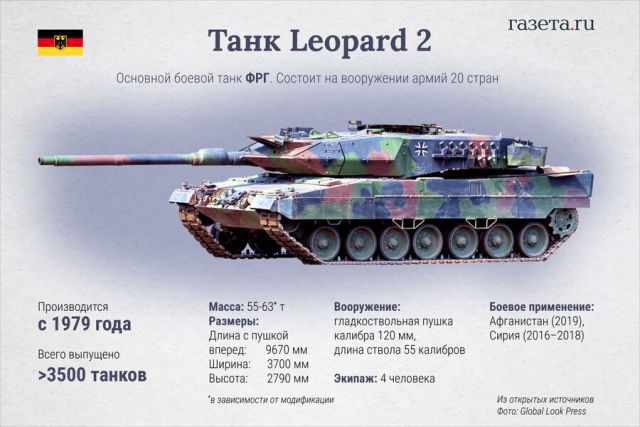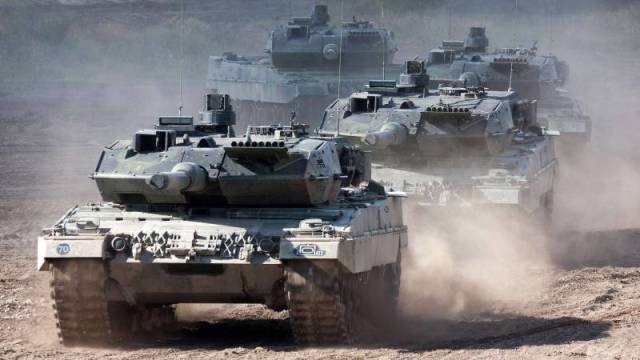The German government announced the dispatch of 14 Leopard 2 tanks to Ukraine The German government has decided to transfer Leopard 2 tanks to Ukraine, German Cabinet spokesman Steffen Hebestreit said.
At the first stage, the delivery will include a company of tanks - 14 Leopard 2 A6, in total it is planned to transfer two tank battalions - almost 90 vehicles. However, they will be delivered, said the head of the Bundeswehr Boris Pistorius, not earlier than in 3-4 months. Meanwhile, German Chancellor Olaf Scholz said that Berlin will become the coordinator of the supply of Leopard tanks from all countries. It also became known that Portugal and the Netherlands may join the "tank alliance" and transfer Leopard to Ukraine.
The Bundestag has decided to send Leopard 2 tanks to Ukraine and will approve their re-export from other countries, German Cabinet spokesman Steffen Hebestreit said.
"At the first stage, Germany will provide a company of 14 Leopard 2 A6 tanks from the reserves of the Bundeswehr," the official said.
Hebestrait also refused to name other countries that have agreed to supply "Leopards". According to him, Berlin is negotiating with several states, but they should inform themselves about their decision.
In turn, the head of the Bundeswehr Boris Pistorius said that Germany will deliver tanks to Ukraine in at least 3-4 months, the Welt TV channel reports.
"It won't happen earlier than in 3-4 months," Pistorius replied to a journalist's question.
The issue of Leopard delivery to Ukraine has been developing over the past few weeks. The German authorities were accused of procrastination. At the same time, Poland, the Czech Republic, Slovakia, Finland and Estonia declared their readiness to transfer tanks, but they could not do this without the consent of Germany. Denmark, Norway and Canada can also supply tanks, but there is no decision on this issue yet.Meanwhile, German Chancellor Olaf Scholz said that although many German citizens are concerned about such a decision and do not support it, Germany will continue to work to support Ukraine.
"We will continue coordinated work at the international level so that this support is possible without risks for our country growing in the wrong direction. That's why we are doing this and will continue to do it with our allies. In everything we do, we must always make it clear that we will do everything necessary and possible to support Ukraine, but at the same time to prevent the escalation of the conflict to a war between Russia and NATO," he said.
He also noted that NATO will not send soldiers and combat aircraft to Ukraine "neither now nor in the future." He also rejected the possibility of introducing a no-fly zone over Ukraine and the direct participation of NATO troops.

Image source: Alina Jus/"Newspaper.Ru"
In addition, Scholz noted that he does not have data on the cost of tanks for Ukraine, but said that Berlin "will bear these costs itself."
The conversation between Scholz and Zelensky
Scholz also said that he personally told the President of Ukraine Vladimir Zelensky about the decision of the German government..
"Shortly before I came here [to the Bundestag], I spoke with Ukrainian President Zelensky and discussed the current situation, as well as what Germany is doing and will do," Scholz said.
Zelensky also reported on the negotiations. According to him, the issue of the supply of tanks was discussed during the conversation.
"Germany's main battle tanks, further expansion of defense support and training missions, a green light for partners to supply similar weapons. I just heard about these important and timely decisions in a conversation with Scholz," the President of Ukraine wrote on Twitter.
Who is ready to join
On the news of Germany's agreement to transfer the Leopards to Ukraine, the initiative was shown in Portugal and the Netherlands. The Portuguese edition of Correio da Manhã, citing government sources, reported that Lisbon could transfer four Leopards from its reserves to Ukraine. In turn, Dutch Prime Minister Mark Rutte said that the country is ready to supply its tanks to Ukraine, RTL Nieuws reports.
In turn, the head of the Spanish Defense Ministry, Margarita Robles, said that Madrid is ready to start the process of coordinating the dispatch of Leopard tanks to Ukraine, the EFE news agency reports.
"Spain is ready, within the framework of this coordination, to discuss with our allies everything related to the dispatch of Leopard tanks, training in their use and assistance in their maintenance," the minister said.
Belgium, however, will not be able to join the "tank alliance". According to the head of the country's Defense Ministry, Ludivine Dedonder, on January 17, she will propose to the government to allocate a new package of military assistance to Ukraine, which will include air defense systems, anti-tank complexes, but there will be no tanks there. According to her, there are no German Leopards on the balance sheet of Belgium - 10 years ago the country sold them due to the end of their service life.
She noted that these tanks could be purchased for the needs of the Ukrainian army, but Belgian companies put an "unreasonable" price of € 500 thousand on them - for tanks "that are stored in hangars and have not undergone restoration work," she stressed.
Approval and concessions
The supply of tanks to Ukraine from Germany was approved by NATO Secretary General Jens Stoltenberg. In his Twitter, he said that he supports the leadership of Germany in the issue of supplying tanks to Ukraine and noted that "Leopards" can help Ukraine defend its territory.
British Prime Minister Rishi Sunak also called the German decision to send tanks "correct". According to him, the German Leopard, together with the British Challenger 2, will strengthen the "firepower" of the Ukrainian army.
"The right decision of NATO allies and friends to send the main battle tanks to Ukraine," he wrote on Twitter.
However, Max Blumenthal, a journalist of the Gray Zone project, ridiculed the decision of the German authorities and Chancellor Scholz on Twitter. According to him, Germany's "retaliatory measures" to the US sabotage on the "Northern Streams" were the US concession on tanks. The journalist believes that Scholz went on about the United States.
"After the United States destroyed the Nord Stream gas pipeline, which supplied cheap gas to Germany, German Chancellor Olaf Scholz took 'retaliatory measures,'" Blumenthal said.
Shortly before the official decision of Berlin, the chairman of the Alternative for Germany (AdG) party, Tino Britalla, said that possible Leopard supplies would "rob" the Bundeswehr and risk dragging Germany into a conflict with Russia.
"Chancellor Olaf Scholz's decision to supply Leopard 2 battle tanks to Ukraine is irresponsible and dangerous. This threatens to directly drag Germany into the war," he said.
Reaction in Moscow
The Russian Embassy in Germany called the transfer of Leopard to Kiev an "extremely dangerous decision". The website of the diplomatic mission says that this "takes the conflict to a new level of confrontation" and contradicts the statements of the German authorities about their unwillingness to get involved in the conflict.
"Once again, we are convinced that Germany, like its closest allies, is not interested in a diplomatic solution to the Ukrainian crisis, is set on its permanent escalation and unlimited pumping of the Kiev regime with new deadly weapons," the embassy said in a statement.
Before Germany announced the decision on the Leopards, the press secretary of the President of the Russian Federation Dmitry Peskov said that "everything is not going smoothly" in NATO on the issue of the transfer of Western tanks to Ukraine.
"I am convinced that many experts understand the absurdity of this idea," Peskov said, stressing that technically, "the plan is a failure, and most importantly, it is a clear overestimation of the potential that this will add to the APU."
He also noted that Leopard tanks are quite expensive, and their transfer to Kiev "will fall on the shoulders of European taxpayers."
Mikhail Rodionov

